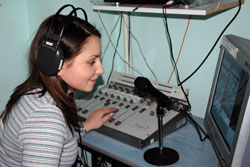You are here » Home » Telling Our Story
Success Story
A radio station run by high-school students spurs dialogue
Broadcasting the Pulse of the City

| |
Photo:BASA Press
|
|
High school students like Christina Strechi run Radio Singera.
"The most important element is to keep the residents informed on what is going on in the city," said Mayor Ghenadie Iurco. "We feel the pulse of the city here."
|
When it was only eight months old, Radio Singera could already claim credit for a major scoop: it was the first media
outlet to broadcast a demonstration in Chisinau, Moldova, against the National TV and Radio Company for
violating journalists' rights. Reporters with cell phones provided listeners with live, on-the-air coverage
from the protest site.
What makes the scoop even more extraordinary is that Radio Singera is run by high school students.
Located in Singera, a town of 15,000 on the outskirts of Chisinau, the radio station sprang from a strategic plan that Singera residents and municipal authorities had developed in cooperation with USAID. City residents approved the creation of the radio station after extensive public dialogue in roundtables, a public-private working group and one of the first public hearings ever held in Moldova.
For decades, Victor Mocanu, a long-time radio buff and Singera resident, had circumvented KGB officials to run a quasi-underground radio station from his home. Now head of the Civil Information Organization, he lobbied to create the radio station as the vehicle for increased communications between city officials and residents. Victor also helped get the school involved and even picked the student staff. The Soros Foundation provided a grant for the purchase of broadcast equipment, and municipal officials provided the site, paid for utilities and helped to obtain the required licensing.
Radio Singera went on the air June 30, 2004. Today it broadcasts 24 hours a day, seven days a week with a variety of programs that provide fodder for community dialogue. As it continues to expand, Radio Singera is looking to develop its news programming by establishing ties with Radio Liberty, Deutsche Welle or BBC as international news sources. The city is also refurbishing a basement section of the school to house its popular media outlet.
"The most important element is to keep the residents informed on what is going on in the city," said Singera Mayor Ghenadie Iurco. "We feel the pulse of the city here."
Print-friendly version of this page (244kb - PDF)
Click here for high-res photo
Back to Top ^ | 

